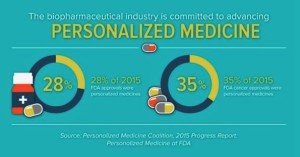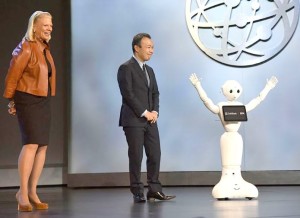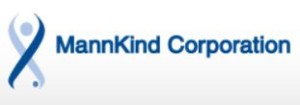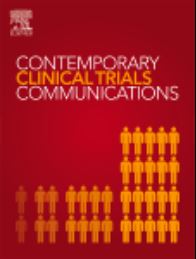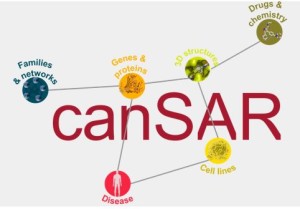- 2015: A banner year for personalized medicine (catalyst.phrma.org)
2015 was a record year for personalized medicine approvals, according to a new analysis from the Personalized Medicine Coalition. This news confirms the growing role of personalized medicine as an approach to treatment that can improve outcomes for patients and also create important efficiencies in the health care system. Personalized medicine is an emerging field of medicine that uses diagnostic tools to identify specific biological markers to help assess which medical treatments and procedures will be best for each patient. Personalized medicine also takes into account patients’ medical history, circumstances and values in developing targeted treatment and prevention plans...45 novel new drugs approved in 2015, the new analysis indicates that 28 percent of novel new drugs approved by the Food and Drug Administration...were personalized, or precision, medicines...Some of the personalized medicine highlights from 2015 include:
- Two new medicines for patients with different forms of non-small cell lung cancer;
- A new combination therapy for patients with cystic fibrosis;
- Two new medicines to help patients with a difficult-to-treat form of high cholesterol; and
- A new targeted therapy for melanoma.
- IBM’s Watson scores deals in fitness, medical and robotics (news.investors.com)
IBM's cognitive computing system, Watson, has graduated from winning "Jeopardy" to predicting hypoglycemic events for diabetes patients and providing the brains for a customer service robot…IBM CEO Ginni Rometty discussed three partnerships involving IBM's Watson during her keynote speech at CES 2016 (Consumer Electronics Show ) on Wednesday in Las Vegas…Rometty talked about how Medtronic, Under Armour and SoftBank Robotics are using Watson's big data analytics capabilities in vastly different ways.
- Medtronic…is using Watson technology for diabetes management. In a new app rolling out this summer, medical technology firm Medtronic will track a diabetes patient's blood-sugar levels and predict life-threatening hypoglycemic events up to three hours in advance of symptoms.
- Under Armour…hooked up to IBM's Watson because he wanted his customers to get more meaningful data-backed health and fitness insights…The company's UA Record app will provide athletes with timely, evidence-based coaching around their sleep, fitness, activity and nutrition, including outcomes achieved based on others "like you."
- Watson also is providing artificial intelligence for a social humanoid robot called Pepper from SoftBank Robotics. Pepper currently is being used as a customer service robot in a limited number of Mizuho Financial Group's bank branches and Nestle coffee shops in Japan.
- Pathway Genomics unveiled a test version of the Pathway Genomics OME app, powered by Watson. The app merges cognitive computing and deep learning with precision medicine and genetics to enable Pathway Genomics to provide consumers with personalized wellness information...
- Drug approvals at 19-year high belie industry challenges (reuters.com)
2015 was a good year for innovation in medicine with the Food and Drug Administration approving 45 novel drugs, four more than in 2014 and the most since the all-time record of 53 set in 1996...the European Medicines Agency recommended 93 new products, including generics, up from 82 in 2014...the prospect for further progress in 2016, the pharmaceuticals industry faces challenges, with increased political focus on drug pricing having punctured both biotech and specialty pharma valuations in recent months...The rapid pace of new approvals reflects accelerated review times by regulators, who want to get life-saving treatments to patients, especially in cancer, as well as an improved scientific understanding of diseases...Full drug pipelines at many companies suggest the strong rate of new drug launches is likely to continue for a while yet, with IMS Health forecasting a total of 225 new drug approvals between 2016 and 2020.
- 3 people to watch in biotech and drug pricing in 2016 (statnews.com)
Big valuations, big investments, and big price tags drove lots of the news in health care in 2015 — and you can bet they’ll do the same in the new year. For signs of where things are headed, keep an eye on these three influencers:
- Jeffrey Marrazzo, chief executive of Spark Therapeutics - Can gene therapy work — and can the system afford to pay for it?...The idea that a one-time treatment could replace a broken gene has generated plenty of scientific and commercial interest.
- Deborah DiSanzo, general manager of Watson Health - IBM’s big bet on health care analytics...use high-powered computing to sift through massive amounts of data to find useful and cost-saving nuggets for medical researchers, doctors, and insurers.
- Vivek Ramaswamy, chief executive of Axovant Sciences - has recruited some top Alzheimer’s researchers to join his...company...they initiated a late-stage clinical trial testing the GSK reject in combination with another Alzheimer’s drug.
- Illumina Launches New Company To Develop Gene-Based Blood Test To Detect Early-Stage Cancers (ibtimes.com)A revolutionary blood test that can detect cancer Liquid biopsies: A $20 billion market ready to explode. (cnbc.com)
Illumina, the world’s largest manufacturer of DNA sequencing machines, announced Sunday the formation of a new company that will develop blood tests that can detect a broad variety of early stage cancers long before symptoms arise. The new company, named Grail, has so far raised $100 million, mostly from Illumina and venture capital firm Arch Venture Partners, but also from Microsoft co-founder Bill Gates, and Amazon founder Jeff Bezos...The holy grail in oncology has been the search for biomarkers that could reliably signal the presence of cancer at an early stage...Illumina’s sequencing technology now allows the detection of circulating nucleic acids originating in the cancer cells themselves, a superior approach that provides a direct rather than surrogate measurement...We hope today is a turning point in the war on cancer...By enabling the early detection of cancer in asymptomatic individuals through a simple blood screen, we aim to massively decrease cancer mortality by detecting the disease at a curable stage...
- Poor sales prompt Sanofi to pull plug on Mannkind inhaled insulin (reuters.com)
Sanofi is to stop selling an inhalable insulin developed by Mannkind, following disappointing sales of the product since its launch in February 2015...The decision to terminate the collaboration marks a blow for the idea of delivering insulin through an inhaler, rather than by injection...Rights to Afrezza will revert to Mannkind from Sanofi...Mannkind said it was reviewing strategic options for the product, although analysts questioned if the drug had any future...We can't imagine that another legitimate diabetes company would show serious interest in this asset...With little hope for resuscitating Afrezza and a dismal balance sheet (net debt), we see Mannkind in an increasingly precarious position...
- The biosimilars are coming. But how long will it be till they can make their mark? (fiercepharma.com)
Biosimilars have made a splash in Europe, Australia and India, and now they're gaining steam stateside. That's sure to continue, with Citigroup analysts estimating innovative biologics will lose $110 billion in sales to copycats by 2025. And with one biosim already on the U.S. market, and more poised for a 2016 liftoff, next year will give drugmakers and payers a taste of the biosim contest to come...One question for next year is pricing. For years, experts have suggested that biosimilars would sell for a modest discount to the original med, but in Europe, Remicade knockoffs have been undercutting Merck & Co.'s branded version by 40% or more, and gaining big market share in the process...Another question: How quickly will doctors flock to biosimilars once they launch? Some research suggests that initially, it won't be fast at all. U.S. doctors don't know much about biosimilars...Plus, doctors may be reluctant to prescribe without flawless data on biosims….
- New open access journal highlights methods and clinical trial results (worldpharmanews.com)ScienceDirect (sciencedirect.com)
The first issue of Elsevier's new open access journal Contemporary Clinical Trials Communications features a new method to make cancer clinical trials more effective, a better way of determining whether a trial was successful and a dashboard that helps patients enroll in trials... Contemporary Clinical Trials Communications publishes methodology and statistics that answer these questions, helping researchers build on each other's work and design better trials...I trust that the readers will find the journal a valuable source of recent advancements in clinical trials...this knowledge can facilitate the design, conduct and analysis of their trials...The journal also aims to tackle the problem of publication bias towards positive results by making all trial data open access...A major objective of the journal is to reduce publication bias, which is a major issue in the field of clinical trials...provides a platform for trialists around the world to share their knowledge on all aspects of clinical trials. We're making scientifically valid and technically sound original research findings freely accessible regardless of their perceived importance or impact.
- Cancer database goes 3D to help drug design (upi.com)
The new imaging adds information on 3 million cavities on the surfaces of nearly 110,000 human molecules to the canSAR database...A large database used for cancer drug development has been improved to include three-dimensional structures...which scientists say could improve approaches to treating cancer...The...database...is used by more than 140,000 researchers around the world to research the effects of more than a million drugs on human proteins....Scientists need to find all the information there is about a faulty gene or protein to understand whether a new drug might work...These data are vast and scattered, but the canSAR database brings them together and adds value by identifying hidden links and presenting the key information easily...Finding new treatments for cancer can be a long and expensive process, so anything that cuts times and costs will help to bring the next generation of therapies to patients even sooner...
- Chinese medicinal herbs provide niche market for US farmers (hosted.ap.org)
Expanding interest in traditional Chinese medicine in the United States is fostering a potentially lucrative new niche market for farmers who plant the varieties of herbs, flowers and trees sought by practitioners...While almost all practitioners still rely on imports from China, dwindling wild stands there, as well as quality and safety concerns, could drive up demand for herbs grown in the U.S. Several states have set up "growing groups" to help farmers establish trial stands of the most popular plants....Traditional Chinese medicine is gaining mainstream acceptance in the U.S. There are 30,000 licensed practitioners across the country - 46 states issue licenses, often requiring a master's degree and continuing education credits. In 2014, the Cleveland Clinic opened one of the first hospital-based Chinese herbal therapy clinics in the country...If growers in the U.S. can produce a highest-quality product that is identical to species from China, without contamination from heavy metals or pesticides, I think it's a great opportunity for farmers...

